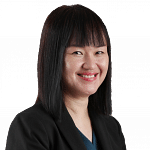SINGAPORE - Identifying one’s mother tongue in multilingual Singapore is not so easy, said media personality Danny Yeo.
The 49-year-old, whose work experience spans radio, television, theatre, writing and education, said his mother tongue should be Cantonese, which he picked up listening to his parents. However, he is Teochew, connects emotionally in Mandarin, and uses English at work.
“I was asked to do an impromptu street performance in my native language while attending an international theatre directors’ symposium in Italy and, lo and behold, I started to speak in Cantonese,” he told The Straits Times.
“It just came naturally and instinctively.”
To him, the mother tongue of many Singaporean children should be English.
“In Singapore, I do think that English is the real mother tongue for many children as their parents speak to them in English, and they grow up in a primarily English-speaking environment,” he said. “Mandarin, Malay or Tamil wouldn’t be their mother tongue if they live 90 per cent of their lives with English. It would be their second language or even a foreign language.”
Mr Yeo delved into what mother tongue means as one of the guests in a four-episode Mandarin podcast titled Same Same But Different – A Chinese Singaporean Podcast, produced by zaobao.sg and presented by the Singapore Chinese Cultural Centre (SCCC).
The podcast invited five guests to share their experiences and opinions on topics such as ancestry, heritage and identity with Lianhe Zaobao Fukan sub-editor Tan Sor Koon and correspondent Tan Yu Xin.
SCCC chief executive Low Sze Wee said the centre welcomes the public to share their thoughts on what it means to be Chinese Singaporean.
“We feel that these are meaningful conversations to have, in order to better appreciate our sense of identity and belonging,” he said. “Our centre’s various programmes and exhibitions – like the podcast series – provide platforms for the public to appreciate diverse perspectives arising from our multicultural society.”
In the podcast series, Ms Carine Tan, 31, co-founder of digital publisher Our Grandfather Story, said that, like Mr Yeo, she has also noticed more Singaporeans speaking English.
Ms Tan and Ms Lynn Wong, youth group leader of Chinese clan association Kong Chow Wui Koon, feel that one’s dialect group is important in defining his identity.
“Some people around me don’t even know their dialect group. They mostly speak English at home and very little Mandarin,” said Ms Tan. “When you ask them what their dialect is, they don’t know.”
Ms Wong, 33, urged Singaporeans to find out more about their ancestry from older relatives who are still alive. “Our generation is possibly the last generation to be able to do it. It could be our last chance,” she said in the podcast.
In another episode, Ms Koh Cheng Jin, a yangqin and violin performer based in New York, shared how, like most Chinese Singaporeans, she is not used to expressing her emotions. She relied on WhatsApp messages to inform her parents that she was dating Malay musician Tengku Irfan, whom she is now married to.
“I would be afraid to speak up or feel awkward if I had to tell them face to face, or hear their voices over the phone. I am not good at opening up to my parents,” the 26-year-old said.
From her interracial marriage, she found out that this is not the norm for other races. Her husband’s family would sit down and openly share their emotions with one another.
Many Singaporeans who grow up in a multicultural society are comfortable studying and working abroad.
Music conductor Wong Kah Chun, who is overseas most of the time conducting orchestras, shared in the podcast how he stays connected to his local roots.
He cherishes Chinese customs like using chopsticks, for instance. When he is back in Singapore, indulging in local food gives him a sense of belonging again.
Said the 36-year-old: “It would mean going out for barbecue stingray or breakfast with my family during weekends. We may have kway chap (noodle soup with pork cuts) for breakfast. To me, these are things that a traditional Chinese Singaporean would do.”
Same Same But Different – A Chinese Singaporean Podcast is available on bit.ly/ssbdpod


